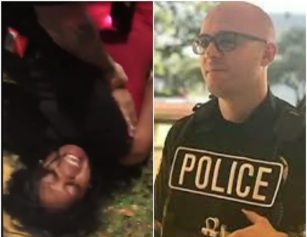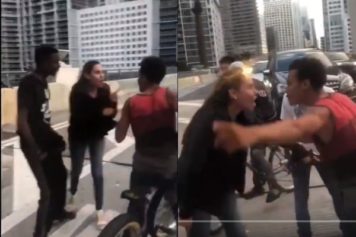In the 1960s, white Miami officials shattered a legendary Black enclave known as Overtown by building elevated expressways through it. Half a century later, here come city fathers with a new affront: A 25,000-seat soccer stadium Overtown residents say will deliver plenty of noise and snarled traffic, but little economic upside for the community.
It doesn’t help that the soccer stadium concept had previously been booted out of an affluent part of Miami that made officialdom heed its reservations. A subsequent effort to build the facility north of Miami, in Broward County, also misfired.
“You’ve got the American Airlines Arena [NBA basketball] right there,” says Overtown print shop owner Gerald Muhammad, 56, standing beside Northwest 8th Street in Overtown and gesturing toward the Miami Heat facility a few blocks east. “You see how this traffic is here?” Muhammad says, glancing incredulously at vehicles crawling through the intersection of 8th Street and 2nd Ave. “You see how it’s backed up and it’s what, 12 o’clock, and there’s no game going on and basketball season hasn’t started? My point is … are you serious?”
State and local government are quite serious when it comes to embracing projects with negligible upside for Overtown, a conclave known as “Colored Town” during the height of Jim Crow.
A pro-stadium group headed by international soccer star David Beckham initially wanted to erect the facility on downtown Miami’s waterfront. That idea got the boot from developers and from a cruise line operating out of Miami in 2014. A subsequent effort to construct a soccer stadium north of Miami, in Broward County, also misfired.
But in June of this year, Beckham and his associates, who were looking for a home for their new Major League Soccer franchise, finally scored with an assist from Miami officials who turned to a familiar dumping ground for disruptive, large-scale construction projects. Specifically, Miami-Dade County sold the Beckham group a $9 million, three-acre parcel that adjoins a six-acre parcel the group had previously bought for $19 million. The land was purchased just west of downtown Miami, and the transactions had the blessing of Black Miami-Dade County Commissioner Audrey Edmonson.
Plans to build a privately-funded $300 million, 25,000-seat soccer stadium, and to provide 50 mostly low-paying jobs for Overtown denizens, have been met with community protests and derision. Overtown’s soccer dissenters recently joined forces with protesters from an adjoining neighborhood, Spring Garden, to form the Overtown Spring Garden Community Collective protest group.
Overtown’s fractious relationship with the South Florida officialdom began in the 1960s, when Miami’s city fathers used eminent domain to ram elevated Interstate 95 highway overpasses through the heart of the bustling community, which had a legendary music scene and a sizable Black middle class.
“Once the I-95 project was mandated upon large swaths of land in Overtown, it caused disruption,” notes Jeff Allen, 61, an interim Miami commissioner who represented Overtown in 2004 and 2005. “It dispersed a large population base that was largely African-American.
“Many Black Americans were forced to move from that region and to secure residences in other areas of Dade County,” says Allen, who’s a civil trial attorney. “And it also brought about the demise of the business and the brain trust of the Black diaspora situated in Overtown at the time. It became a community in disrepair that had horrible economic conditions and a low-income population base.”
Someone who views a soccer facility as a positive is architect and cultural activist Neil Hall, whose Urban Collective art and design center sits in Overtown’s epicenter on NW 2nd Avenue. “I think the idea of a soccer stadium in Overtown is a good idea,” Hall says. “It’s a bad idea, maybe, in terms of where it would be located, because it’s not as pristine a space as on the east side of 95. However, it’s still Overtown.”
A soccer stadium could bring myriad business opportunities to Overtown, in Hall’s view.
But other Overtown Blacks view the soccer initiative, and local government representatives, with unabated suspicion.
In 1980 a massive race riot swept Overtown after four white Dade County police officers were acquitted of manslaughter in the fatal beating of Black Miami motorcyclist Arthur McDuffie, 33.
In 2005, Overtown lost a particularly pugnacious advocate when former Miami city commissioner Arthur Teale strode into the lobby of the Miami Herald and fatally shot himself, five days after being arraigned on federal corruption charges.
Were Teale alive today, he wouldn’t be surprised to see Miami is currently a public hearing or two away from ushering a soccer facility into the middle of what used to be one of the city’s premier Black neighborhoods, says Miami Herald Editorial Page Editor Nancy Ancrum, who’s Black.
“I had a conversation with Art Teale way, way, way back, I think it was still the 1990s,” Ancrum says. “He was all about Overtown, he was all about the health and vibrancy of the community and its redevelopment. I asked him point blank: `Art, will Overtown be redeveloped for the people who live there?’
“There was this pause, he looked me in the eye and he said, `No!’ And we are seeing this come to pass. You do not redevelop areas for poor people! It’s unfortunate, it’s unconscionable in many, many cases, but it’s reality.
“I think that Overtown as we knew it is long gone,” Ancrum says. “Does it pain me to say that? Yes, in some ways. And does it pain me that the people who stuck it out there because they had no other place to go are being forced out? Yes, it does. But Overtown has been in the sights of developers for decades now, and as we see other developments moving into the Overtown area, I think that having the stadium there is almost inevitable.”


